Academic Language
学术英语(理工)详解答案-Unit-1

Genetic engineering
– If the topic is too general, how do you narrow it down to a more manageable topic?
Universe
– Can you suggest some
appropriate topics of each
In which aspect do the two essays share the same idea? Both focus on the vulnerability of a computer.
9
Unit 1 Choosing a Topic
1 Deciding on a topic
In which aspect do the two essays differ?
U.S. Dollars. 16 __e_x_p_lo_i_t ___ (开拓) a new market in the city 17 be absorbed in the social _n_e_t_w_o_r_k_in_g_ (社交网络) 18 __i_n_v_o_lv_e___ (涉及) unnecessary extra charges 19 only one __in_s_t_a_n_ce___ (实例) out of many 20 get to know more about the _s_p_e_c_ifi_c_a_ti_o_n (具体的细节) of
Lecture 1 Questions Lecture 2 Questions Lecture 3 Questions
4
Unit 1 Choosing a Topic
1 Deciding on a topic
语言学教程英文版
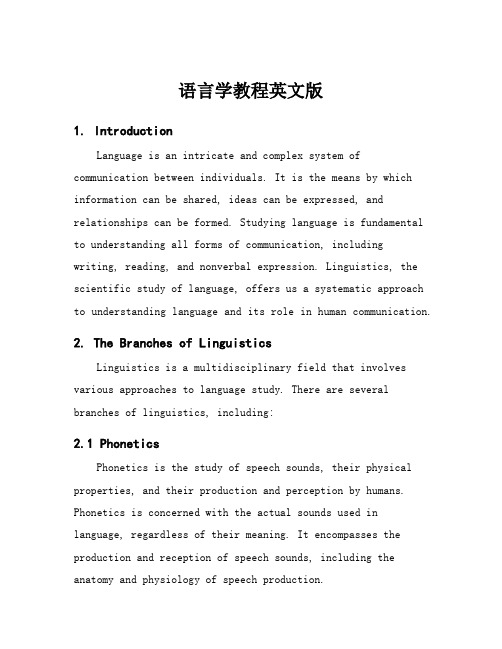
语言学教程英文版1. IntroductionLanguage is an intricate and complex system of communication between individuals. It is the means by which information can be shared, ideas can be expressed, and relationships can be formed. Studying language is fundamental to understanding all forms of communication, including writing, reading, and nonverbal expression. Linguistics, the scientific study of language, offers us a systematic approach to understanding language and its role in human communication.2. The Branches of LinguisticsLinguistics is a multidisciplinary field that involves various approaches to language study. There are several branches of linguistics, including:2.1 PhoneticsPhonetics is the study of speech sounds, their physical properties, and their production and perception by humans. Phonetics is concerned with the actual sounds used in language, regardless of their meaning. It encompasses the production and reception of speech sounds, including the anatomy and physiology of speech production.2.2 PhonologyPhonology is the study of the sound system of language, including the rules and patterns that govern the use and organization of speech sounds in a particular language. Phonology investigates the systematic relationships between sounds and how they are interpreted to convey meaning.2.3 MorphologyMorphology is the study of the structure of words and how they are formed from smaller units (morphemes) that carry meaning. Morphology is concerned with the internal structure of words, including morpheme identification, inflection, and derivation.2.4 SyntaxSyntax is the study of how words are combined to form meaningful phrases, clauses, and sentences. Syntax is concerned with the rules governing word order, grammatical agreement, and the use of function words (such as conjunctions and prepositions) to establish relationships between words.2.5 SemanticsSemantics is the study of meaning in language, including the meanings of words, phrases, and sentences. Semanticsanalyzes how meaning is conveyed through language and how different words and phrases can have multiple meanings.2.6 PragmaticsPragmatics is the study of language use in context and the ways in which speakers convey meaning beyond the literal meaning of words. Pragmatics investigates the social and situational factors that influence language use, including the speaker's intentions, the listener's expectations, and the shared cultural background of both.3. Key Concepts in LinguisticsLinguistics is concerned with understanding how language works and how it is used in everyday communication. There are several key concepts that are central to linguistic analysis: 3.1 Language UniversalsLanguage universals are patterns or tendencies that are found across all languages. These are features of language that are common to all human languages, such as the presence of consonants and vowels or the use of subject-verb word order.3.2 Language RelativityLanguage relativity is the idea that language and culture have a reciprocal relationship, with each influencing andshaping the other. This concept suggests that the structure and vocabulary of a language can shape the way its speakers perceive and understand the world around them.3.3 Language AcquisitionLanguage acquisition is the process by which humans learn a language. The study of language acquisition investigates how children learn to speak and understand their native language and how adults learn a second language.3.4 Language ChangeLanguage change is the process by which language evolves over time. This concept includes changes in the sound, structure, and meaning of language and can be influenced by social, cultural, and historical factors.4. ConclusionLinguistics is a fascinating field that helps us understand the intricate and complex nature of human communication. The study of linguistics provides us with a systematic approach to understanding language and its role in human society. With its focus on language universals, language relativity, language acquisition, and language change, linguistics offers us insights into how wecommunicate, how we learn, and how language shapes our understanding of the world.。
学术英语学习计划大学生
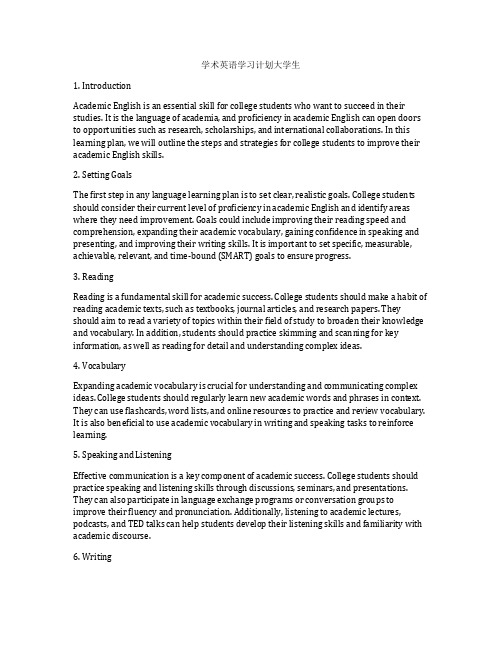
学术英语学习计划大学生1. IntroductionAcademic English is an essential skill for college students who want to succeed in their studies. It is the language of academia, and proficiency in academic English can open doors to opportunities such as research, scholarships, and international collaborations. In this learning plan, we will outline the steps and strategies for college students to improve their academic English skills.2. Setting GoalsThe first step in any language learning plan is to set clear, realistic goals. College students should consider their current level of proficiency in academic English and identify areas where they need improvement. Goals could include improving their reading speed and comprehension, expanding their academic vocabulary, gaining confidence in speaking and presenting, and improving their writing skills. It is important to set specific, measurable, achievable, relevant, and time-bound (SMART) goals to ensure progress.3. ReadingReading is a fundamental skill for academic success. College students should make a habit of reading academic texts, such as textbooks, journal articles, and research papers. They should aim to read a variety of topics within their field of study to broaden their knowledge and vocabulary. In addition, students should practice skimming and scanning for key information, as well as reading for detail and understanding complex ideas.4. VocabularyExpanding academic vocabulary is crucial for understanding and communicating complex ideas. College students should regularly learn new academic words and phrases in context. They can use flashcards, word lists, and online resources to practice and review vocabulary. It is also beneficial to use academic vocabulary in writing and speaking tasks to reinforce learning.5. Speaking and ListeningEffective communication is a key component of academic success. College students should practice speaking and listening skills through discussions, seminars, and presentations. They can also participate in language exchange programs or conversation groups to improve their fluency and pronunciation. Additionally, listening to academic lectures, podcasts, and TED talks can help students develop their listening skills and familiarity with academic discourse.6. WritingWriting is a central skill in academic English, and college students should focus on improving their writing abilities. They can practice writing essays, reports, and research papers, and seek feedback from peers or instructors. Students can also use writing resources and style guides to improve their grammar, punctuation, and academic writing style. It is important to practice writing regularly and revise drafts to make continuous improvements.7. Grammar and SyntaxA strong grasp of grammar and syntax is essential for effective communication in academic English. College students should review and practice grammar rules, sentence structure, and punctuation. They can use grammar books, online exercises, and writing tools to identify and correct grammatical errors in their writing. Additionally, students should pay attention to sentence variety and coherence to improve the clarity and flow of their writing.8. Academic Writing GenresUnderstanding the conventions of academic writing genres is important for college students to produce high-quality academic work. Students should familiarize themselves with different types of academic writing, such as literature reviews, research papers, and critical analyses. They can analyze sample texts and research articles to understand the structure, organization, and language features of academic writing genres.9. Time Management and PracticeImproving academic English skills requires consistent practice and dedication. College students should allocate time for daily language practice, such as reading, vocabulary study, writing exercises, and speaking activities. It is important to create a structured study plan and set aside dedicated time to work on specific language skills. Additionally, students should practice English in academic contexts, such as taking notes, participating in class discussions, and engaging in academic projects.10. Feedback and ReflectionReceiving feedback from peers, instructors, or language tutors is essential for improvement. College students should seek opportunities to receive constructive feedback on their academic English skills, such as writing assignments, presentations, and language assessments. Additionally, students should reflect on their language learning progress, identify areas for improvement, and set new goals to continue advancing their academic English proficiency.11. ConclusionImproving academic English skills is a gradual process that requires dedication, practice, and a structured learning plan. College students should set clear goals, engage in regular language practice, seek feedback, and reflect on their progress to continuously improve their academic English proficiency. By focusing on reading, vocabulary, speaking, listening,writing, grammar, academic writing genres, time management, and feedback, students can develop the language skills necessary for success in their academic pursuits.。
学术英语综合-Unit-5
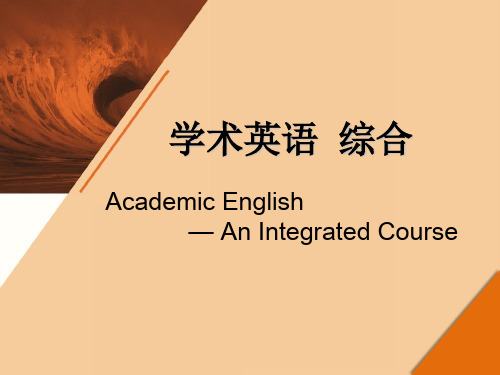
2. Reading
•Summarize the main idea of a text and grasp the two sides of an argument
•Understand difficult sentences (e.g. sentences with abstract meaning or ambiguous reference)
.
Unit 5
Philosophy
Text A Supplementary information
2. Behaviorist
Behaviorists are people who believe in behaviorism. Behaviorism is a philosophical theory which believes that mental states can be analyzed in terms of publicly observable actions; in other words, behavior can be described and explained without reference to mental events or psychological processes. This school of thought tends to emphasize the external sources of behavior and dismiss the internal sources (the mind). The mind hence has no independent significance.
Discuss these questions with each other. Then read Text A to see how the writer might answer these questions.
学术英语Unit 5练习答案

Unit 5 Writing an Academic Essay
1 Definition
Enhancing your academic language
Complete the following expressions or sentences. 12 resources of cultivable (可耕种的) land 13 temper (缓和) criticism with reason 14 lobby (游说……以争取) for the funds 15 He is at the leading-edge (领先地位). 16 a(n) array (一系列) of information 17 be deficient (缺乏的) in nutrition 18 be restricted (限制) to adults 19 unfounded (没有根据的) suspicions 20 Coal can be converted (使转变) to gas. 21 a(n) devastating (毁灭性的) hurricane 22 staple (主要的) exports of this country 23 transform (转变) dream into reality
5 尤其在运输基础设施落后的国家,地理条件对食物供给的 限制正如遗传学为食物供给带来的希望一样大。
Unit 5 Writing an Academic Essay
1 Definition
Enhancing your academic language
Match the words with their definitions.
Unit 5 Writing an Academic Essay
academic English

Describe
Discuss
To argue the case for two or more positions on an issue and evaluate these positions. Often you will say which position you support. To put forward a particular position on a topic, or to challenge a position given in the essay question.
4
Avoiding plagiarism
Why plagiarism might be unacceptable?
5
Recognizing variation across academic subjects
Different academic subjects are interested in different topics and consequently use different methods of working and ways of talking and writing about their work
A company website
A’dot com’ suffix, less formal language, focus on selling a product rather than research
A general information website
Website name, a ‘dot com’suffix, unknown author, wiki feature
8
Unit one
学术英语综合 Unit 6-文档资料
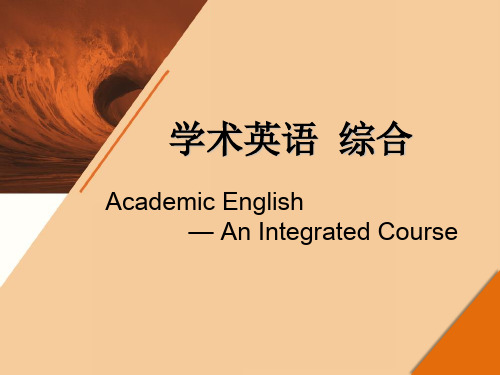
mathematics always remain revisable and, in principle at
least, fallible. Ernest's version of social constructivism has
led to strong criticism. The principal criticism is that
constructivist philosophy, the theorems(定理;原理), truths
and objects of mathematics are all cultural products
created by humans. The theorems and truths of
Now work in pairs and share your answers with your partner.
9
Unit 6
Text A Overview
Mathematics
Summarize the main ideas of Text A on the basis
of Task 1/Critical Reading and Thinking/Text A.
mathematical theorems are truths and truths by their
nature are infallible.
15
Unit 6
Mathematics
Text B Text analysis
1. Summarize the major argumentations raised in Text B by doing Task 1/Critical Reading and Thinking/Text B.
学术英语综合Unit 5-文档资料
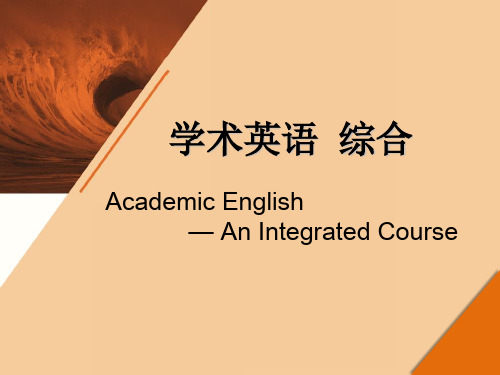
Unit 5
Philosophy
Text A Lead-in
The American science fiction movie Matrix (黑客帝国) describes a world dominated by robots who manipulated human beings.
Do you think such a world would one day come to reality? Why or why not?
believe she has a mind (and not, say, an innate prejudice), … (Para. 9) • It seems that our conviction that people have minds is no better
based than the belief that there could be understanding computers. (Para. 12) • ... in the same boat. (Para. 12) • It is time now to find our way up that tower to have a look around. (Para.15)
9
Unit 5
Philosophy
Text A Supplementary information
2. Behaviorist
Behaviorists are people who believe in behaviorism. Behaviorism is a philosophical theory which believes that mental states can be analyzed in terms of publicly observable actions; in other words, behavior can be described and explained without reference to mental events or psychological processes. This school of thought tends to emphasize the external sources of behavior and dismiss the internal sources (the mind). The mind hence has no independent significance.
Academic_vocabulary
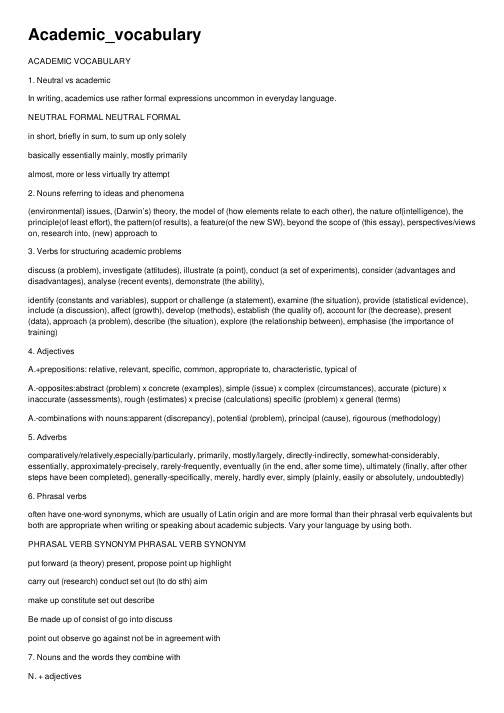
Academic_vocabularyACADEMIC VOCABULARY1. Neutral vs academicIn writing, academics use rather formal expressions uncommon in everyday language.NEUTRAL FORMAL NEUTRAL FORMALin short, briefly in sum, to sum up only solelybasically essentially mainly, mostly primarilyalmost, more or less virtually try attempt2. Nouns referring to ideas and phenomena(environmental) issues, (Darwin’s) theory, the model of (how elements relate to each other), the nature of(intelligence), the principle(of least effort), the pattern(of results), a feature(of the new SW), beyond the scope of (this essay), perspectives/views on, research into, (new) approach to3. Verbs for structuring academic problemsdiscuss (a problem), investigate (attitudes), illustrate (a point), conduct (a set of experiments), consider (advantages and disadvantages), analyse (recent events), demonstrate (the ability),identify (constants and variables), support or challenge (a statement), examine (the situation), provide (statistical evidence), include (a discussion), affect (growth), develop (methods), establish (the quality of), account for (the decrease), present (data), approach (a problem), describe (the situation), explore (the relationship between), emphasise (the importance of training)4. AdjectivesA.+prepositions: relative, relevant, specific, common, appropriate to, characteristic, typical ofA.-opposites:abstract (problem) x concrete (examples), simple (issue) x complex (circumstances), accurate (picture) x inaccurate (assessments), rough (estimates) x precise (calculations) specific (problem) x general (terms)A.-combinations with nouns:apparent (discrepancy), potential (problem), principal (cause), rigourous (methodology)5. Adverbscomparatively/relatively,especially/particularly, primarily, mostly/largely, directly-indirectly, somewhat-considerably, essentially, approximately-precisely, rarely-frequently, eventually (in the end, after some time), ultimately (finally, after other steps have been completed), generally-specifically, merely, hardly ever, simply (plainly, easily or absolutely, undoubtedly)6. Phrasal verbsoften have one-word synonyms, which are usually of Latin origin and are more formal than their phrasal verb equivalents but both are appropriate when writing or speaking about academic subjects. Vary your language by using both.PHRASAL VERB SYNONYM PHRASAL VERB SYNONYMput forward (a theory) present, propose point up highlightcarry out (research) conduct set out (to do sth) aimmake up constitute set out describeBe made up of consist of go into discusspoint out observe go against not be in agreement with7. Nouns and the words they combine withN. + adjectivescontact – useful, valuable, personal, constant, close, frequent, intermittentdebate – considerable, heated, intense, public, animatedelements – crucial, decisive, fundamental, conflicting, constituentphenomenon – common, isolated, natural, recent, universalresults – conflicting, in/conclusive, unforeseen, preliminary, encouragingrole – decisive, challenging, influential, key, majorsample – random, representativein... terms – absolute, relative, general, practicalway – alternative, efficient, practical, convenient, proper, acceptableN. + verbscontact – come into c. with, establish, maintain, break off, losedebate – engage in, contribute to, d. surrounding an issueelements – combine, differentiate, discern,phenomena – observe, investigate, explainresults – collect, question, invalidate, falsify, publishrole – define, strenghten, play, take onsample – take, provide, analyseway – discover, devise, work out, develop8. Adjectives + nounsAdjectives of importance + nounsimportant – aspect, contribution, difference, implications, point, question, reason, element significant – increase, reduction, number, proportionmajor/minor - role, changes, problem, factor, issue, concern, difference, theme, contribution, pointenormous/considerable – amount, expansion, number, range, diversity, differnece, variation, extent, degree, impact, power, influence, significance, interestparticular – interest, attention, significance, importance, concernAdjectives of frequency + nounsWidespread – belief, acceptance, support, opposition, assumption, use.Common (frequent) – experience, practice, use, concern(shared) – knowledge, ground, feature, interestSpecific – context, information, case, type, form, purpose, characteristics, conditions, example. Other adjective + noun combinationsInevitable combines with words relating to results or changes – consequence, outcome, collapse, decline, conflict, effect, developmentsExplicit combines with words relating to how things are presented – reference, statements, comparison, account, mention Relevant combines with words relating to evidence – data, documents, information, details, factors 9. Verbs + nouns + adverbsVerb Noun Adverbsto be based on research, theory, story,mainly, partly, looselyhypothesisto associate with word, idea, theorem, term generally,commonly, invariablyto discuss idea, problem, issue, question,at length, briefly, thoroughlytopic, themeto establish relationship, connection firmly, clearly, conclusivelyto examine facts, evidence, effects, aspects briefly, critically, thoroughlyclearly, convincinglyto demostrate existence, need, effects,importanceclearly, correctly, closelyto identify causes, factors, issues,properties, needs, approach,origin10. Prepositional phrasesIN conjuction, in comparison, in line with; in general, in particular; in addition to, in spite of, in terms of; in some ways, in turn, in most respects;ON the whole, on the one hand ... on the other hand; on the basis of, on behalf ofw ith the exception of; as a result (of), at this point/stage; for the most part11. Verbs + prepositionsto draw, comment, concentrate, focus, rely/rest onto be exposed, attributed, traced, to amount, attend (deal with, give one’s attention) toto associate, provide, couple, equip withto depart, benefit, exclude fromto write, speak of (rather formal), convince, dispose ofto account search, call argue for12. Nouns + prepositionsbook, article, essay, lecture, project, assignment about, onresearch, investigation, insight, inquiry intoanalysis, examination, exploration, study, issue ofproblem, difficulty of, withreason, motivation, rationale forlook, attempt atchanges, differences, increase, decrease ininfluence, emphasis, effect onbasis, idea, lack, means ofreason, need, basis, case, preference forrelation, approach, response, attention toattitude, tendency, move, progress to/towardsprinciple, assumptions, rationale, logic behindrelationship, difference, distinction between13. Referring to source materialsThe… literature suggests that, the … draws its data from/draws primarily on, several secondary sources were also consulted,… proved a valuable resource, I also surveyed the literature on, I directly/indirectly cite those works which, an extensive body of literature exists on, as noted, is often attributed to, …. Is dealt with in, … is treated separately from the main body of…14. Degrees of certaintyBeing tentativeThere is some evidence that…, it can be argued that…, it may not be the case that…, it would seem/appear that…, we can presume that…, there seems/appears to be some evidence that…, we can draw the tentative conclusion that…It is true or almost trueIt is undoubtedly true that…, it is, of course…, it is evident that…, the research will probably lead to…, there is a tendency for…, there is every likelihood that…The writer is unsure… has allegedly come to some…conclusions, … is reportedly…15. Criticism of/ reference to an author… asserts/claims/believes that, in his/her view, … touches on, … calls for,… underestimates/overestimates, ignores, … is not persuasive, … does not ring true, worse, the evidence is … at best16. Organizing your writingWorking through a list of different things – firstly, secondly, thirdly, next, lastly/finally Changing topic/bringing in new points / we now/ let us (now) turn toReferring forward – below, in the next section, later,Referring back - above, in the preceding section, earlier, as we have seenReferring to examples, diagrams, pages / as can bee seen, see, for exampleSource: McCarthy, Michael, O’Dell, Felicity. Academic Vocabulary in Use. Cambridge: Cambridge University Press, 2008。
学术英语写作academic language

学术英语写作(Academic Language)是一种用于学术和专业领域的英语写作风格。
它具有以下特点:
- **准确性**:使用准确的词汇和语法,避免模糊或歧义。
- **专业性**:运用特定领域的专业术语和词汇,体现学术的专业性。
- **逻辑性**:结构清晰,段落之间有明确的逻辑关系。
- **客观性**:以客观的态度表达观点,避免主观情感和个人偏见。
- **正式性**:语言风格较为正式,避免口语化和随意的表达。
- **引用和参考**:正确引用他人的研究成果,以支持自己的观点并提供参考依据。
- **论证性**:通过论证和证据来支持观点,使文章具有说服力。
要提高学术英语写作水平,可以多阅读相关领域的学术文献,学习其写作风格和表达方式。
同时,注重语法和词汇的积累,不断练习写作,接受老师或同行的反馈,都有助于提升学术英语写作能力。
学术英语-理工--Unit-2练习答案

2 I have to make some presumptions (推测). 3 go through what he calls a period of political brinkmanship
10 a new assembly (装配) line
11 yield (屈服) to the enemy
12 make incredible (难以置信的) progress
13 unrealistic optimism (乐观)
14 in recent mob (暴徒) violence
3
2 Scanning and skimming
9
3 Identifying topic sentences
for information
Enhancing your academic language
Match the words with their definitions.
23 the optimal (最正确的) method for improving speaking practice
2 他们主要靠耕种来养活自己,然后再多种一些用以物品交 易或卖一些盈余。
3 从事农业和畜牧业者的绝对数量大约在1910年时到达顶峰 〔约有1,100—1,200万〕,在此之后人数便急剧下降。
5
2 Scanning and skimming
Enhancing your academic language
24 refuse to confess (成认) to his crime 25 Even the best quality rubber will perish (毁坏) with age. 26 Unless the employers move (采取行动) quickly, there will
关于学术英语的英语作文
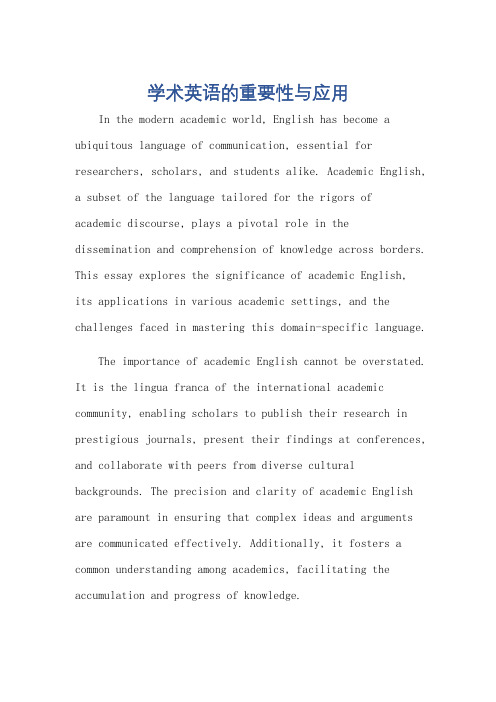
学术英语的重要性与应用In the modern academic world, English has become a ubiquitous language of communication, essential for researchers, scholars, and students alike. Academic English, a subset of the language tailored for the rigors of academic discourse, plays a pivotal role in the dissemination and comprehension of knowledge across borders. This essay explores the significance of academic English,its applications in various academic settings, and the challenges faced in mastering this domain-specific language. The importance of academic English cannot be overstated. It is the lingua franca of the international academic community, enabling scholars to publish their research in prestigious journals, present their findings at conferences, and collaborate with peers from diverse cultural backgrounds. The precision and clarity of academic English are paramount in ensuring that complex ideas and arguments are communicated effectively. Additionally, it fosters a common understanding among academics, facilitating the accumulation and progress of knowledge.In the realm of applications, academic English findsits use in diverse academic settings. In the field of research, it is used to write proposals, articles, and books, ensuring that the research findings are accurately communicated to a wide audience. In higher education, academic English is employed in teaching and learning, helping students develop the critical thinking and analytical skills necessary for success in their academic careers. Moreover, it plays a crucial role in international education, bridging the language barrier and promoting cultural exchange among students from different parts of the world.However, mastering academic English is not without its challenges. The language is highly specialized, requiring a specific vocabulary, syntax, and tone. Additionally, the rigorous demands of academic writing can be daunting, especially for non-native speakers. To overcome these challenges, scholars and students alike need to invest significant time and effort in developing their academic English proficiency. This involves regular practice,critical reading, and writing, as well as seeking feedback from peers and mentors.In conclusion, academic English is an indispensable tool for scholars and students seeking to engage in the global academic community. Its significance lies in its ability to facilitate effective communication, promote knowledge accumulation, and foster cross-cultural understanding. While mastering academic English poses challenges, the rewards of being able to participate fully in the international academic discourse are immense. By investing in their academic English proficiency, scholars and students can open up a world of opportunities for themselves, contributing to the global academic landscape in meaningful ways.**学术英语的重要性与应用**在现代学术领域,英语已成为研究人员、学者和学生交流的普遍语言。
Academic Style学术英语特点
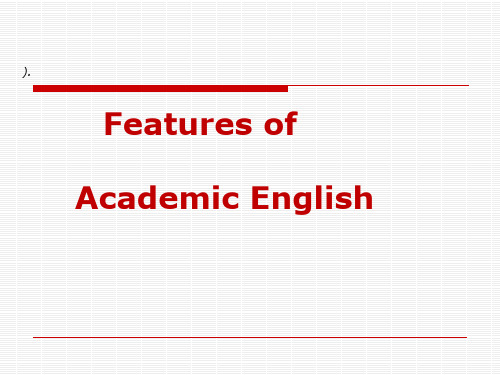
From the above analysis, we can see the Internet plays a significant role in our daily life.
Feature 2: Objectivity (客观)
Why: Since the emphasis of academic writing is on intellectual ideas and factual information rather than on emotions or individual experiences, you should avoid expressing personal opinions arising out of intuition, feeling, prejudice or your own experience. How: From the above analysis, it can be inferred that…… The above analysis seems to indicate that the Internet plays a significant role in our daily life. According to the above analysis, ……
2. The sentences are always long and complex, instead of being simple and short. (nominal clauses, relative clauses, participles) 3. Have few abbreviations, e.g., It is
How can we make tentative statements?
Features of Academic Language学术语言的特征

Features of Academic Language
Consciouvoided in academic language?
1. Contractions; 2. Hesitation fillers, exclamatory expressions; 3. Colloquialisms; 4. Exclamatory and imperative sentences (sometimes questions); 5. Sentences starting with conjunctions.
Three relations to be considered:
1. Simplicity and intricacy; 2. Elegance and vulgarity; 3. Objectiveness and subjectiveness.
Three areas where mistakes occur:
Reference:
1. This does not agree with the result. This contradicts the result. This is not consistent (in agreement) with the result. 2. Five more tests will be necessary before the experiment can be conducted. 3. It is possible to consider the results from a different viewpoint.
1. The use of pronouns; 2. The use of verb tenses; 3. The use of the article.
研究生学术英语课后习题答案
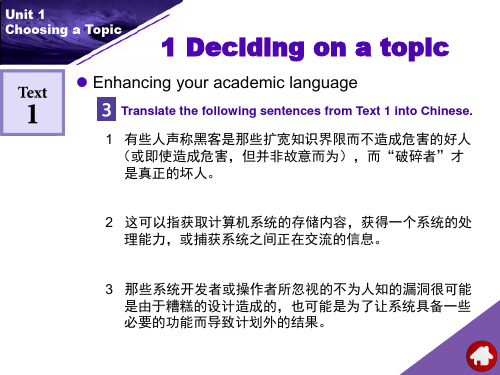
Unit 1 Choosing a Topic
1 Deciding on a topic
Enhancing your academic language
Translate the following sentences from Text 1 into Chinese.
4 另一种是预先设定好程序对特定易受攻击对象进行攻击, 然而,这种攻击是以鸟枪式的方式发出的,没有任何具体 目标,目的是攻击到尽可能多的潜在目标。
1 有些人声称黑客是那些扩宽知识界限而不造成危害的好人 (或即使造成危害,但并非故意而为),而“破碎者”才 是真正的坏人。
2 这可以指获取计算机系统的存储内容,获得一个系统的处 理能力,或捕获系统之间正在交流的信息。
3 那些系统开发者或操作者所忽视的不为人知的漏洞很可能 是由于糟糕的设计造成的,也可能是为了让系统具备一些 必要的功能而导致计划外的结果。
Unit 1 Choosing a Topic
1 Deciding on a topic
Enhancing your academic language
Translate the following sentences from Text 2 into Chinese.
4 间谍软件与垃圾邮件和钓鱼网络一起,构成了三个令人生 厌的互联网害虫。尽管有些程序可以通过入侵软件漏洞从 而进入电脑,但这些有害而秘密的程序通常会随着其他通 常是免费的应用软件侵入到计算机系统中。
1 看似无害的编程错误可以被利用,导致电脑被侵入并为电 脑蠕虫和病毒的繁衍提供温床。
2 当一个软件漏洞被发现,黑客可以将漏洞变成一个侵入点, 从而造成极大的破坏,在这之前,往往需要争分夺秒地利 用正确的软件补丁来防止破坏的发生。
学术英语 综合 Unit 2 PPT
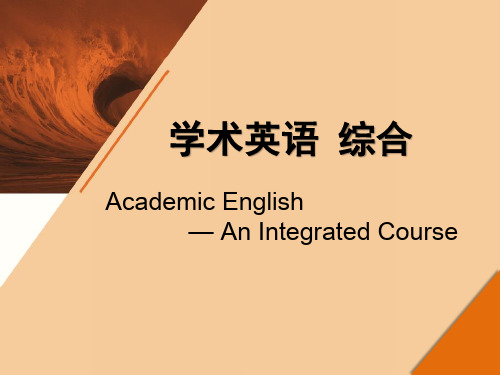
Unit 2
Business Ethics
Unit Objectives
6. Researching • Independently locate and study a variety of resources (articles, books, videos, etc.) to find out a Chinese or foreign company which has kept the right balance between earning profits and taking social responsibility 7. Academic language and discourse • Acquire some specialized vocabulary in business • Learn how to add an idea • Comprehend stylistic differences between formal and informal English and acquire some formal expressions
Text A In-depth analysis
1. Contribute as much as possible what you know about the following. • economic system • free enterprise
Unit 2
Business Ethics
Unit 2
Business Ethics
Unit Objectives
3. Listening • Grasp the major points made by the speaker(s)
对学术英语的理解

对学术英语的理解【学术英语Academic English】这个概念目前大家还比较陌生,觉得学术英语那就是学术写作能力。
其实这个理解是比较片面的。
而且也许很多同学觉得都是英语学习,并没有什么区别,但是在英语母语国家中,还区分了【会话英语Conversational English 】和【学术英语Academic English】会话英语Conversational English: 是一种非正式语体,也被称为商洽体,比如日常商谈,电话联络,记者采访,名人漫谈,还有一些名人演讲也是常见的会话类型的。
所以,有些口语和演讲呢,为了达到主观的情感和意见的表达,会使用比较多的短语和肢体动作,来达到快速的沟通效果。
所以会话英语也被称为Basic Personal Communication Skills。
学术英语Academic English: 是一种正式的语体,是应用在学术学习中所使用的英语语体。
它是对物品或者事件客观的描述,用于解释说明某一些现象,过程,或者真理。
所以,同学们在国外学习期间,课本上的知识点和阐述都是非常客观的描述。
相对来说,语言形式比较正式,在校期间的小论文Essays,Reports 报告,科研文章Research Articles 或者概述Sumaries 都是需要运用学术英语的正式语体去写作。
常见特点:客观的表述,不带个人感情色彩和评价.2. 不建议使用‘me, I, you, your' 等个人化的描述。
3. 不推荐使用被动语态,建议使用主动语态(主语+谓语+宾语+状语+补语)因为被动语态总是给人消极的感情色彩,或者是不好的事情发生。
I was caught by the rain last night. 我被雨淋了。
4. 尽量避免缩写,要用完整的词汇。
比如TV要写成television, ID 是Identification Card,Won't ---Would not,it's---it is,doesn't --Does not.5. 动词的使用也是要确定是正式语体(Formal )还是非正式语体(Informal)。
- 1、下载文档前请自行甄别文档内容的完整性,平台不提供额外的编辑、内容补充、找答案等附加服务。
- 2、"仅部分预览"的文档,不可在线预览部分如存在完整性等问题,可反馈申请退款(可完整预览的文档不适用该条件!)。
- 3、如文档侵犯您的权益,请联系客服反馈,我们会尽快为您处理(人工客服工作时间:9:00-18:30)。
Grammatical Competence
• Understanding and the ability to appropriately apply rules of English is required at two levels:
– When using everyday/informal English students must be able to:
• Form grammatically correct, simple sentences • Form complex sentences with subordinate clauses • Apply knowledge of the noun system (application of plural endings, irregular plurals, definite/indefinite articles and demonstratives) • Apply knowledge of the verb system to form sentences using all verb tenses (present, past, present perfect, present continuous, future, modal, etc. for regular and irregular verbs)
Phonological Features
• To use academic English, students must:
– Knowledge of graphemes and sound-symbol correspondences – Understand and be able to apply stress, intonation and sound patterns
Cognition
• Although the linguistic dimension of academic language is important, academic language also relies on students’ cognition:
– To think about a text in order to interpret it – To predict, infer, and synthesize meaning – To read for intention, to question sources, and to obtain factual information – “The cognitive dimension of academic English minimally includes knowledge, higher order thinking, cognitive, and metalinguistic strategies” (Scarcella, 2003)
• describe, explain, analyze
– How academic words are formed with prefixes, roots, and suffixes
• investigate, hypothesize
– Parts of speech of academic words – Grammatical constraints governing academic words
What is Academic Language?
• Academic language is: – The language of academic disciplines, of texts and literature, and of extended, reasoned discourse – Language that students must comprehend to access the concepts associated with a particular discipline (e.g., mathematics, science, social science) and use to demonstrate their understanding of those concepts (Anstrom, et al., 2010)
Common features of Academic Language
Conciseness High density of informatid syntactic structures
Different Types of Knowledge Needed to Foster Academic Language
Discourse
• Units of language that are more than one sentence in length, can allow for the organization of speech and writing, and convey meaning and coherence across sentences
• antebellum • facile
Lexical Features
• Academic language requires knowledge of:
– Forms and meanings of words that are used across academic disciplines
Academic English
Does not use hedges Avoids personal pronouns Uses sophisticated transition words (moreover) Uses academic words
Additional Differences Between Informal and Academic English
Characteristics of Language Types
Informal English
Uses hedges (kind of, sort of) Uses personal pronouns (I) Uses simple connectors (but, also, and) Uses slang (stuff, guys)
What is Academic Language?
• Academic language: – Cannot be defined dichotomously (i.e., a student has mastered it or has not) but exists on a continuum, with informal, casual conversation at one extreme and the formal, technical presentation of ideas at the other extreme
• Academic language extends beyond the use of specific academic vocabulary to require knowledge in the following areas:
– Understanding of the phonological features of English – Lexical knowledge (e.g., vocabulary, word formation rules) – Grammatical competence – Discourse – Cognition
• CAnada / caNAdian • inCIte / INsight • REcord / reCOrd
– Be familiar with the sound patterns of English but able to learn and recognize patterns from words borrowed from other languages
Contents
Definition Common features Knowledge needed to apply to academic language Characteristics of Language Types Additional Differences Between Informal and Academic English
What is Academic Language?
• Academic language is: – Language used in academic settings and for academic purposes to help students acquire and use knowledge (Anstrom, et al., 2010) – Words and syntactic structures that students are likely to encounter in textbooks and tests, but not in everyday, spoken English (Strategic Education Research Partnership, 2010) – “The language used in the learning of academic subject matter in a formal schooling context; aspects of language strongly associated with literacy and academic achievement, including specific academic terms or technical language and speech registers related to each field of study.” (TESOL, 2003)
